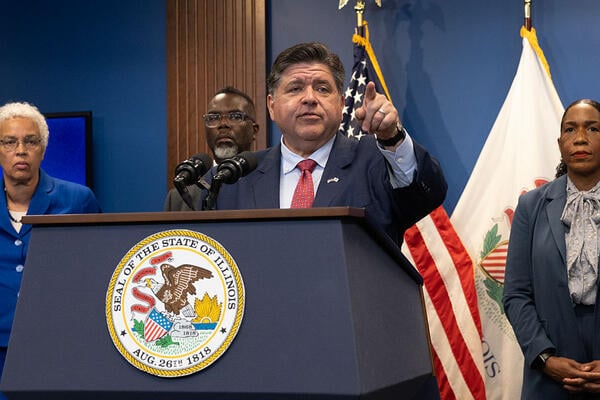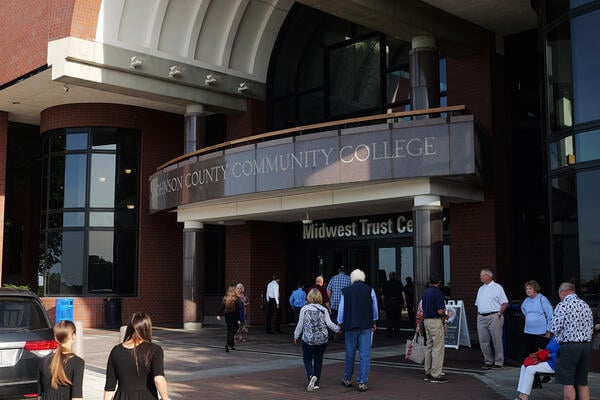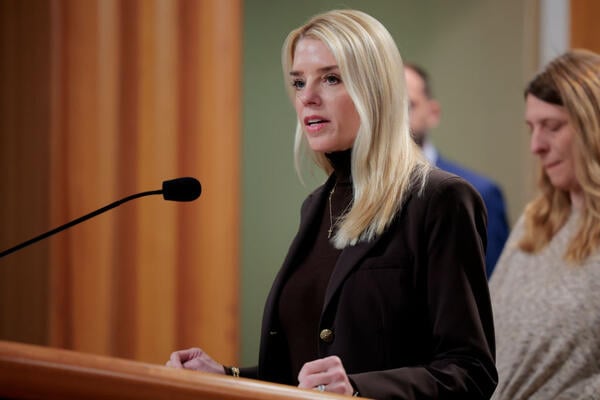In August, FIRE sued Secretary of State Marco Rubio for violating the First Amendment.
Since March, Rubio and the Trump administration had been detaining and attempting to deport legally present noncitizens for protected speech — including writing op-eds and attending protests — because they disliked that speech.
To do it, they invoked two provisions of the Immigration and Nationality Act: one that allows the secretary of state to initiate deportation proceedings against any noncitizen for protected speech if the secretary “personally determines” the speech “compromises a compelling foreign policy interest,” and another that enables the secretary of state to revoke the visa of any noncitizen “at any time” for any reason.
This, as FIRE has argued, is unconstitutional. Noncitizens in the United States have First Amendment rights, and Rubio’s use of these provisions not only violates those rights, but also showcases why the two provisions are unconstitutional and must be struck down to the extent they allow adverse immigration action based on protected speech.
Of course, the government sees it differently. They have leveled several arguments for why their conduct is defensible, necessary, and constitutional. However, a brief filed on October 20 by FIRE explains why the government’s arguments don’t withstand scrutiny.
Here’s a breakdown of the government’s claims and why the law points in the other direction.
The government says it isn’t targeting protected speech — despite all evidence to the contrary
The government’s attorneys in this case insist that the claims of FIRE’s plaintiffs — The Stanford Daily, which employs the writing of noncitizen journalists and covers the impact of the war in Gaza on campus, and Jane and John Doe, who engage in pro-Palestinian advocacy — should be dismissed because the government, the attorneys argue, “do[es] not pursue visa revocations and removal proceedings purely based on political speech.”
Unfortunately, everything government officials have said and done proves otherwise.
President Trump, for instance, has vowed to deport “any student that protests” and revoke visas of “antisemitic” students. Rubio has stated publicly that “people that are supportive of movements” he determines “run counter to the foreign policy of the United States” are subject to visa revocation and deportation.
Officials tasked with carrying out these promises have also testified that a wide variety of pro-Palestinian speech, including chanting “from the river to the sea, Palestine will be free,” calling Israel “an apartheid state,” and “criticizing Israel’s actions in Gaza,” are sufficient to justify action under the revocation and deportation provisions. These are all forms of political expression protected by the First Amendment, proving in both word and deed that the government is in fact targeting noncitizens for their free speech.
“Secretaries Noem and Rubio are engaging in a mode of enforcement leading to detaining, deporting, and revoking noncitizens’ visas solely on the basis of political speech,” U.S. District Judge William Young wrote in a 161-page assessment of the Trump administration’s behavior, “and with the intent of chilling such speech and that of others similarly situated.”
And that chilling effect is another important aspect of this case.
The government’s actions are a chill on protected speech
When combined, the two provisions of the Immigration and Nationality Act grant the secretary of state nearly unlimited authority to target noncitizens whose protected speech they dislike, to revoke the visas of those noncitizens, and to initiate deportation proceedings.
If you’re a visa or green card holder in the United States, that’s going to make you think twice about speaking your mind — and that’s the point.
FIRE’s plaintiffs John and Jane Doe have engaged in and planned to engage in speech about American foreign policy and Israel — including accusing Israel of committing “genocide” and using the slogan “from the river to the sea, Palestine will be free.” All of this speech is protected by the First Amendment, but because the provisions of the Immigration and Nationality Act enable the secretary of state to revoke a visa and render noncitizens deportable based on this exact type of speech, that speech is being chilled. Jane Doe is choosing not to speak out anymore, and John Doe is continuing to speak but fears enforcement action.
FIRE’s other plaintiff, The Stanford Daily, is experiencing a similar chilling effect. As a newspaper committed to “to cover[ing] all relevant campus activities in an unbiased fashion and provide an outlet for Stanford community members to publish opinions,” the newspaper has a keen interest in covering the voices of students on campus — which necessarily includes noncitizens with pro-Palestinian views.
However, due to the provisions of the Immigration and Nationality Act, as well as the actions Rubio and the Trump administration have already taken to target disfavored speech, noncitizen journalists have refused assignments and even quit the newspaper out of fear. One need only to look at the case of Rümeysa Öztürk, a Tufts student who was detained for writing an op-ed critical of Israel, for ample reason behind The Stanford Daily’s concerns.
The implications here should be obvious. If there is a credible threat of the government revoking your visa and engaging in deportation proceedings for speech you publish in your school newspaper, you’re unlikely to take the risk. This not only violates the First Amendment rights of these noncitizens, it also harms the ability of all citizens to read and hear perspectives about matters of public importance that the current administration doesn’t like.
The provisions of the Immigration and Nationality Act are unconstitutional and must be struck down
The First Amendment prohibits Congress from enacting — and the executive branch from enforcing — laws penalizing speakers because of their opinions, no matter their immigration status.
It’s as simple as that.
The idea, from our nation’s founding, is to protect the “inalienable” right to free expression. Our Founders did not believe that free speech was a privilege granted to us by our government, but rather a right inherent to us all, which required protection from government. And there is no historical merit to the idea, forwarded by some, that these rights were only ever intended for American citizens. In fact, many of the most prominent and controversial voices during our nation’s founding were noncitizens.
This is why the Supreme Court has repeatedly recognized that the First Amendment’s protection for free speech applies to noncitizens, noting in cases such as Kwong Hai Chew v. Colding that:
Once an alien lawfully enters and resides in this country he becomes invested with the rights guaranteed by the Constitution to all people within our borders. Such rights include those protected by the First and the Fifth Amendments … They extend their inalienable privileges to all ‘persons’ and guard against any encroachment on those rights by federal or state authority.
For all of these reasons, the revocation and deportation provisions of the Immigration and Nationality Act — which the government itself has publicly acknowledged allows it to revoke noncitizens’ visas and render them deportable for protected expression — are an unconstitutional violation of the First Amendment.
The government argues that, because its actions involve immigration and foreign policy in this case, its “authority is at its zenith” and its arguments are “entitled to the most deference from the courts.” However, it is basic high school civics, and noted in the 1803 case Marbury v. Madison, that “it is emphatically the province and duty of the judicial department to say what the law is.”
The Supreme Court has also explained, as it did in Holder v. Humanitarian L. Project, that “[o]ur precedents, old and new, make clear that concerns of national security and foreign relations do not warrant abdication of the judicial role. We do not defer to the Government’s reading of the First Amendment, even when such interests are at stake.”
And as the Ninth Circuit court noted in Washington v. Trump, “the Supreme Court has repeatedly and explicitly rejected the notion that the political branches have unreviewable authority over immigration or are not subject to the Constitution when policymaking in that context.”
The Constitution does not disappear when important issues are at stake. The point of a written constitution is to prevent the political branches from declaring the limits of their own power. The provisions of the Immigration and Nationality Act are a clear violation of these principles. Both constitute viewpoint and content discrimination because they permit the government to impose adverse immigration consequences on lawfully present noncitizens simply because the secretary of state dislikes their political speech.
No person should hold such power under our system of government. For these reasons, FIRE is seeking a landmark ruling that these provisions are unconstitutional to the extent they allow the secretary of state to revoke visas or initiate deportation proceedings based on protected speech.
America is different, and that’s a good thing
Regardless of your opinions on the political speech in question, if you value the First Amendment, this case should matter to you. This doesn’t just implicate the expression of lawfully present noncitizens. It also implicates your ability to hear speech that the government finds unfavorable to its interests — and that is a critical freedom that sets America apart.
As FIRE’s brief notes:
America is different. Over the centuries, as the world’s nations jailed, censored, and exiled unpopular speakers in the name of some pressing interest, we charted a different course. In our country, Thomas Jefferson explained, “the rights of thinking, and publishing our thoughts by speaking or writing” are inalienable rights belonging to the individual and never surrendered to a government’s control. To protect those inalienable rights, the Founders crafted the First Amendment, ensuring that “Congress shall make no law” abridging the right of individuals to think and speak for themselves. The Bill of Rights’ opening command, forged when noncitizen Europeans were some of the most prolific and controversial commentators of the day, makes “no distinction between citizens and resident aliens.”
For a more detailed and granular assessment of the arguments forwarded in this case, we encourage you to read the brief in full.












